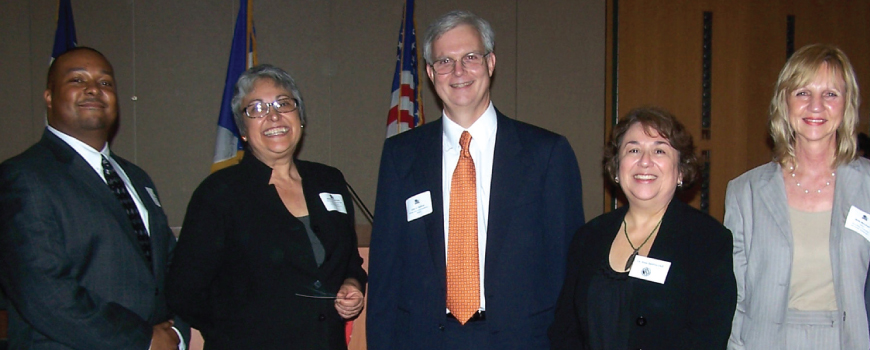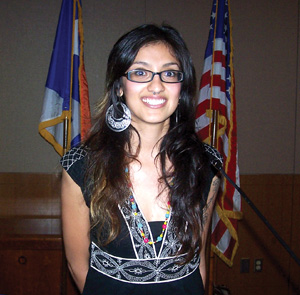
Expansion
Consortium for Social Transformation
The Civil Rights Movement isn’t really over, says Michael Jennings. Decades after the enactment of such legislation as the Voting Rights Act and Fair Housing Act—and with the nation’s first person of color in the Oval Office—the Civil Rights Movement still is not over and in fact has “a long way to go,” he says. “The movement has changed; it looks different than it did 50 or 60 years ago,” says Jennings, Associate Professor in the Department of Educational Leadership and Policy Studies and director of the African American Studies program. “But there still are human rights and civil rights struggles that we are dealing with in our world and in our own country.” An academic institution has a unique obligation as part of that struggle, Jennings says—whether or not its academics also consider themselves activists—to advance understanding and appreciation of different cultures.
To that end, The University of Texas at San Antonio is taking a bold step in reaffirming its commitment to its mission of embracing multiculturalism and its vision of preparing students to engage in the global environment. In January 2011, UTSA launched the Consortium for Social Transformation, an entity within the College of Education and Human Development that will house the university’s ethnic and area studies programs in African American Studies, Mexican American Studies and Women’s Studies. The consortium is intended to strengthen the role and presence of these existing programs, as well as aspiring programs, at the university.
Jennings has been appointed Associate Dean to lead the consortium. “UTSA, as a Hispanic-serving institution, obviously has a diverse student body. Strengthening our ethnic and area studies programs will help us recruit a more diverse faculty, too,” he said.
“Another part of this is bringing these programs to the table together to find opportunities for interdisciplinary research and teaching. There are all cross currents we hope to achieve.”
The consortium grew out of the Provost’s Inclusiveness Task Force, which in 2008 issued a report recommending centralizing these programs in the College of Education and Human Development.
Betty Merchant, Dean of the college, thinks it’s a natural fit. “We’re preparing educators—counselors, health practitioners, teachers and administrators. As a college of education, we have to be proactive and progressive in helping our students identify the contributions that women and people of color have made to our society and to include these contributions in the curriculum when they begin teaching,” she says. “As it is, our students can go through their curriculum and have very little understanding of the diverse populations with whom they will be working. The idea behind all the programs in the Consortium for Social Transformation is that social equality is directly related to educational equality,” she continued. “It’s more than cultural exchange; it’s about fulfilling the need to educate more people in our community.”
Having strong ethnic and area studies programs supports the university’s strategic plan, UTSA 2016, and exemplifies the strategic plan’s foundational themes of promoting diversity, globalization and transformative leadership, says John Frederick, UTSA provost and vice president for academic affairs.
But no matter what a university’s strategic plan or mission statement says, he says, sometimes there can be friction between academics who believe their primary duty is to impart knowledge and those who heed a call to activism. “The truth of the matter is, too often these programs have been marginalized in academia, just as the people they represent were historically marginalized in our society,” Frederick said. “It’s not enough to simply create these programs. We must fully commit to them by creating an environment where they can flourish.”
Historically in the U.S., ethnic and area studies programs were borne out of controversy, having their beginnings in the Civil Rights Movement, the Farm Workers Movement and the secondwave feminist movement of the 1970s. Corollary academic programs began emerging at U.S. colleges and university in the ’60s and ’70s as a result of student and faculty activism. Even though UTSA did not introduce any ethnic or area studies programs until decades later, each of the three programs in the new Consortium of Social Transformation has seen their own share of controversy.
In addition to overseeing existing ethnic and area studies programs, the consortium will also serve as an incubator to aspiring programs in areas such as Asian and Pacific Islander Studies, American Indian Studies, and Sexual and LGBTQ Studies. David Kessler, who has been working to create an LGBTQ resource center at UTSA since 2005, believes that the consortium will help pave a smoother road for aspiring programs. “All of us have something to learn from each other,” he said. “From the trials and tribulations everyone has gone through, we can recognize similar challenges and bring new ideas to each other. “For LGBT studies, we might be looking at another two to four years before we can establish an academic program. But having some of that historical knowledge of how other programs moved forward will be very important, and hopefully we won’t face the same challenges.”
The oldest program in the group, Mexican American Studies, was created as an undergraduate degree program in 1994. It was begun after years of lobbying by Hispanic student leaders and after the Texas Legislature passed the South Texas Initiative in 1993 to address concerns that the state had not done enough to recruit and retain Mexican American students to its public universities. Even now, UTSA is one of only five public institutions of higher education in the state that offers a bachelor’s degree in Mexican American Studies, according to the Provost’s Inclusiveness Task Force report.
UTSA’s Women’s Studies Institute was established in 2003, following the publicly criticized 2001 closure of the Center for the Study of Women and Gender. The institute houses the university’s Women’s Studies program, which began offering a B.A. as of spring 2009.
In 2007, students protested after the cancellation of a class in the African-American Studies program; the university cited lack of interest among students, but supporters countered that administrators had failed to promote the minor. It was that allegation, in fact, that spurred the creation of the Provost’s Inclusiveness Task Force by then-Interim Provost Julius Gribou.
In spring 2009, a smaller steering committee including some members from the original task force has been working to draft a proposal and memorandums of understanding for the Consortium for Social Transformation. That committee includes Jennings; Sonia Saldívar-Hull, director of the Women’s Studies Institute and program; Marie “Keta” Miranda, director of Mexican American Studies; David Kessler, academic adviser in the College of Liberal and Fine Arts; and Sonia Martinez, special assistant to President Ricardo Romo.
“I think the greatest benefit of the consortium is the idea of sharing and partnership,” Miranda said. “This is growth at a particular time of tightening budgets in all of higher education.
What this says is not that the university administration is putting us together because they don’t know what to do with us; they’re putting us together so that we can share knowledge and resources. So that is growth.” Though the programs within the consortium are in different stages in their development, Miranda says the committee members already have benefitted from their dialogue. “The commonality between us is we all need to develop more attention universitywide about the significance of each of these programs,” she said. For the fall 2010 semester, 82 students at UTSA have declared majors or minors in Mexican-American Studies, Women’s Studies or African American Studies. About 315 students are enrolled in unique courses in those subjects this semester, not including the numerous courses that are cross-listed with other departments.
Cross-listing MAS, WS and AAS courses with more core courses will help to increase enrollment in those classes and programs, Merchant says. She also hopes to introduce within the College of Education and Human Development a post-baccalaureate certificate for which students would have to complete 15 hours of coursework from programs within the Consortium for Social Transformation. The certificate, she says, would make COEHD graduates more marketable to schools that serve diverse populations.
Having the faculty to teach courses has been her greatest challenge in Women’s Studies, says Saldívar-Hull, who joined UTSA in 2001 from UCLA, where she had been involved in establishing the Ph.D. in Women’s Studies. Cross-listing more courses and creating memorandums of understanding between departments through the consortium will alleviate that problem and allow the program directors to work on building their curriculum. “Every week I get calls from people who want to know about our degree program, and last week I got a call from someone who wanted to know when UTSA would have a Ph.D. in Women’s Studies,” she says. “That’s years away, but all of us in the consortium are interested in growing our programs.”


